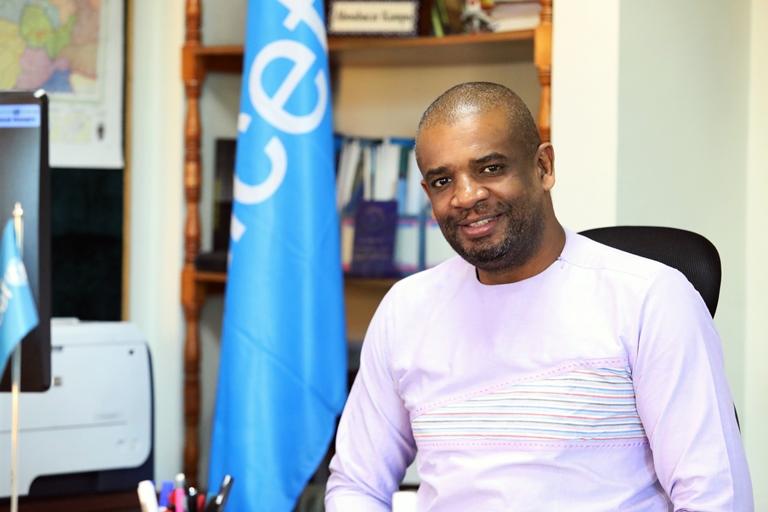KABUL of children which is a priority of the Government Afghanistan and cannot be ignored.
UNICEF Afghanistan Representative, Dr. Aboubacar Kampo, told Pajhwok Afghan News in an exclusive interview that this is a global pandemic impacting several countries, and currently, some 450 million children are out of school across the South Asia region.
Dr. Aboubacar Kampo said Covid-19 times in Afghanistan worsens the situation for children. Continued conflict and insecurity over the past four decades have impacted on development, resulting to lost livelihoods and increased poverty, especially amongst vulnerable families, with children being the most affected.
He further added there were over 600,000 malnourished children in Afghanistan while over three million children were out of school across the country, even before Covid.
Kampo added that UNICEF was supporting the Ministry of Education on alternative solutions to learning during the school closure and supporting the government to make sure handwashing facilities existed in schools when they do reopen.
UNICEF Afghanistan Representative said the provision of sanitation and hygiene facilities would be supported for children both in schools and community-based education centres. He said it was not known when schools would reopen formally due to the evolving situation. “If it comes in winter season, then we need to get prepared the schools and the kids as well.”
On the other hand, the Ministry of Education (MoE) says they have been working on alternative options for the education system in the country.
Nooria Nehzat, spokeswoman for the MoE, told Pajhwok they conducted short term courses in the open sky where social distancing was also observed nation-wide.
She said the MoE had signed a contract of 3,000 textbooks, videos materials with the education system of Turkey to keep alive the teaching process for primary students in the country.
Meanwhile, Dr. Mirwais Balkhi, the minister of education, says they have been working on a comprehensive education plan which would be implemented in Kabul and in the rest of provinces in near future.
On the other hand, the Agha Khan Foundation has also signed an agreement with MoE TV to connect it with the satellite in 34 provinces.
Balkhi said they have also talked with officials of Afghan film to make some learning videos.
Islmial Miakhel, the National Radio Television (RTA) head, said they were establishing education programs in capital Kabul and in 34 provinces.
Asif Shinwari, the Nangarhar education department spokesman, told Pajhwok they had signed a contract with some local TV channels for broadcasting the education system online.
With schools in the South Asian region closed amid COVID-19 concerns, Afghanistan has started organising the home delivery of learning materials to reach the most excluded students.
Afghanistan had started delivering the content of textbooks through radio and TV in Herat province and plans were underway for a model to be taken nationwide, UNICEF said.
“As the current coronavirus crisis unfolds, many of the 430 million children affected by school closures in South Asia are now in danger of dropping out of the education system,” the UN agency said in a statement.
It warned: “Vulnerable and hard-to-reach children may never return to school if they get further behind due to not being reached with alternative ways to learn during school closures.”
Although COVID-19’s impact on school children had been mitigated in the short term by creative approaches to term breaks and examinations, countries across South Asia urgently needed to develop plans for continued education at home to be prepared for possible longer closures, the statement stressed.
Jim Ackers, an advisor at UNICEF’s Regional Office for South Asia, said: “We are concerned that prolonged school closures could hit girls and the most vulnerable, including those with disabilities the hardest.
“Girls are often obliged to take care of household chores and look after siblings. We are also concerned about the psychological impact on children of increasing incidents of domestic violence during lockdowns,” the official added.
Only 33% of the people in the region had access to the internet, UNICEF said, referring to inadequate access to radio and television in some parts of the region. Only 35% of rural Nepal has access to television.
UNICEF said it was trying to support governments in the region to ensure children could continue with their education at home in partnership with other agencies.
Most countries in South Asia have received external funding for the purpose, including through the Global Partnership for Education and bilateral partners.
“The coronavirus has turned into a complex emergency that threatens children and young people in many ways – including their right to learn,” said Jean Gough, regional director of UNICEF in South Asia. “We need to see urgent action to ensure that children’s futures are not compromised.”
Pk/ma








GET IN TOUCH
NEWSLETTER
SUGGEST A STORY
PAJHWOK MOBILE APP